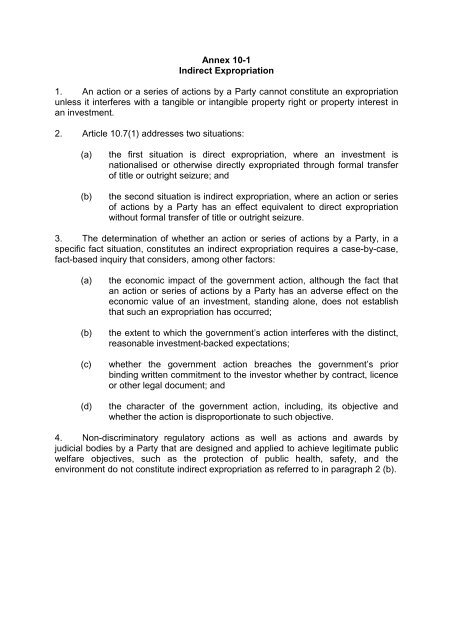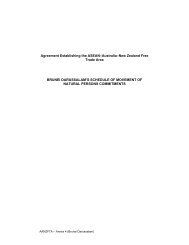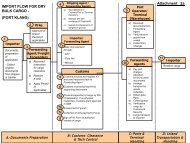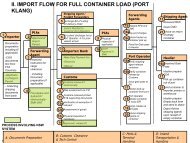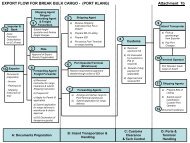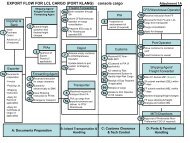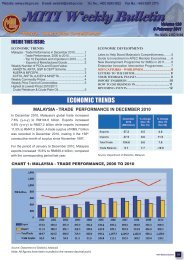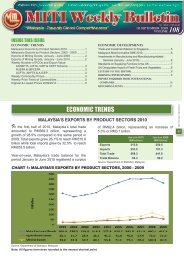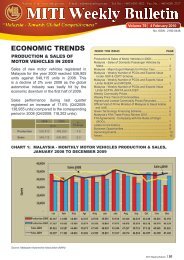- Page 1 and 2:
COMPREHENSIVE ECONOMIC COOPERATION
- Page 3 and 4:
List of Annexes Annex 2-1 Schedules
- Page 5 and 6:
CHAPTER 1 INITIAL PROVISIONS AND GE
- Page 7 and 8:
(CC) any area extending beyond the
- Page 9 and 10:
Article 2.7 Administrative Fees and
- Page 11 and 12:
For the purposes of this Chapter: C
- Page 13 and 14:
(g) goods of sea-fishing and other
- Page 15 and 16:
(b) for goods falling within Chapte
- Page 17 and 18:
(iii) the goods have not undergone
- Page 19 and 20:
CHAPTER 4 CUSTOMS COOPERATION Artic
- Page 21 and 22:
(b) provide for advance electronic
- Page 23 and 24:
(a) whether goods imported into the
- Page 25 and 26:
For the purposes of this Section: C
- Page 27 and 28:
9. On the termination of a bilatera
- Page 29 and 30:
5. A Party proposing to apply or ex
- Page 31 and 32:
Section C General Provisions Articl
- Page 33 and 34:
2. Notwithstanding paragraph 1, the
- Page 35 and 36:
areas are, and are likely to remain
- Page 37 and 38:
(b) in the event that the checks re
- Page 39 and 40:
Article 6.16 Exchange of Informatio
- Page 41 and 42:
(a) technical specifications prepar
- Page 43 and 44:
2. The Parties shall cooperate with
- Page 45 and 46:
3. The Parties shall seek to ensure
- Page 47 and 48:
the other Party, a Party may consul
- Page 49 and 50:
technical consultations within thir
- Page 51 and 52:
5. New services shall be considered
- Page 53 and 54:
(i) is a citizen of that other Part
- Page 55 and 56:
numerical units in the form of quot
- Page 57 and 58:
Article 8.8 Review The Parties shal
- Page 59 and 60:
or arrangement, or to negotiate a c
- Page 61 and 62:
consultations with that Party on su
- Page 63 and 64:
CHAPTER 9 MOVEMENT OF NATURAL PERSO
- Page 65 and 66:
(ii) a goods seller, being a natura
- Page 67 and 68:
(ii) is employed by a juridical per
- Page 69 and 70:
4. Each Party shall maintain or ins
- Page 71 and 72:
(b) enterprise of a Party means any
- Page 73 and 74:
Article 10.5 Minimum Standard of Tr
- Page 75 and 76:
(f) payments arising out of the set
- Page 77 and 78:
Article 10.12 Reservations 1. Artic
- Page 79 and 80:
Treatment), Article 10.6 (Compensat
- Page 81 and 82:
opportunity to present their views
- Page 83 and 84:
Parties otherwise agree. These disc
- Page 85 and 86:
(e) Tourism; (f) Small and Medium E
- Page 87 and 88:
CHAPTER 12 GENERAL EXCEPTIONS Artic
- Page 89 and 90:
of restrictions to ensure, inter al
- Page 91 and 92:
(b) such persons are afforded a rea
- Page 93 and 94:
CHAPTER 14 DISPUTE SETTLEMENT Artic
- Page 95 and 96:
2. If the Parties agree, good offic
- Page 97 and 98:
Article 14.10 Proceedings of Arbitr
- Page 99 and 100:
Article 14.13 Time Frame All time f
- Page 101 and 102:
(b) the complaining Party may suspe
- Page 103 and 104:
(f) consult third parties on any ma
- Page 105 and 106:
(f) develop conditions and provisio
- Page 107 and 108:
2. Each Party shall provide to the
- Page 109 and 110:
Article 16.6 Confidentiality Where
- Page 111 and 112:
Annex 2-1 Schedules of Tariff Commi
- Page 113 and 114:
(i) Category 1: reduction of applie
- Page 115 and 116:
3. For tariff lines subject to spec
- Page 117 and 118:
Schedule of Tariff Commitments Mala
- Page 119 and 120:
“RVC(XX)” means that the good m
- Page 121 and 122:
Column 1 Column 2 Column 3 Column 4
- Page 123 and 124:
(CC) factory security (DD) insuranc
- Page 125 and 126:
(c) the other statements of the CO
- Page 127 and 128:
(b) For multiple goods declared und
- Page 129 and 130:
(v) the Issuing Authority receiving
- Page 131 and 132:
(ii) the exporter has sold the good
- Page 133 and 134:
OVERLEAF NOTES Original /Duplicate
- Page 135 and 136:
Annex 6-1 (List of Products for Req
- Page 137 and 138:
Annex 7-2 Mutual Recognition Agreem
- Page 139 and 140:
Modes of supply: 1) Cross-border su
- Page 141 and 142:
Modes of supply: 1) Cross-border su
- Page 143 and 144:
Modes of supply: 1) Cross-border su
- Page 145 and 146:
Modes of supply: 1) Cross-border su
- Page 147 and 148:
Modes of supply: 1) Cross-border su
- Page 149 and 150:
Modes of supply: 1) Cross-border su
- Page 151 and 152:
Modes of supply: 1) Cross-border su
- Page 153 and 154:
Modes of supply: 1) Cross-border su
- Page 155 and 156:
Modes of supply: 1) Cross-border su
- Page 157 and 158:
Modes of supply: 1) Cross-border su
- Page 159 and 160:
Modes of supply: 1) Cross-border su
- Page 161 and 162:
Modes of supply: 1) Cross-border su
- Page 163 and 164:
Modes of supply: 1) Cross-border su
- Page 165 and 166:
- the capability of implementing in
- Page 167 and 168:
Annex 8-1 Schedule of Malaysia Expl
- Page 169 and 170:
Modes of supply: 1) Cross-border su
- Page 171 and 172:
Modes of supply: 1) Cross-border su
- Page 173 and 174:
Modes of supply: 1) Cross-border su
- Page 175 and 176:
Modes of supply: 1) Cross-border su
- Page 177 and 178:
Modes of supply: 1) Cross-border su
- Page 179 and 180:
Modes of supply: 1) Cross-border su
- Page 181 and 182: Modes of supply: 1) Cross-border su
- Page 183 and 184: Modes of supply: 1) Cross-border su
- Page 185 and 186: Modes of supply: 1) Cross-border su
- Page 187 and 188: Modes of supply: 1) Cross-border su
- Page 189 and 190: Modes of supply: 1) Cross-border su
- Page 191 and 192: Modes of supply: 1) Cross-border su
- Page 193 and 194: Modes of supply: 1) Cross-border su
- Page 195 and 196: Modes of supply: 1) Cross-border su
- Page 197 and 198: Modes of supply: 1) Cross-border su
- Page 199 and 200: Modes of supply: 1) Cross-border su
- Page 201 and 202: Modes of supply: 1) Cross-border su
- Page 203 and 204: Modes of supply: 1) Cross-border su
- Page 205 and 206: Modes of supply: 1) Cross-border su
- Page 207 and 208: Modes of supply: 1) Cross-border su
- Page 209 and 210: Modes of supply: 1) Cross-border su
- Page 211 and 212: Modes of supply: 1) Cross-border su
- Page 213 and 214: Modes of supply: 1) Cross-border su
- Page 215 and 216: Modes of supply: 1) Cross-border su
- Page 217 and 218: (d) cost-oriented rates means based
- Page 219 and 220: 3. Access to and Use of Public Tele
- Page 221 and 222: 4.3 Each Party shall endeavour to e
- Page 223 and 224: (b) Options for Interconnecting wit
- Page 225 and 226: links and submarine cable capacity
- Page 227 and 228: services, unless the requirement is
- Page 229 and 230: Business Visitors ANNEX 9-1 (a) Mal
- Page 231: (ii) documentation demonstrating th


